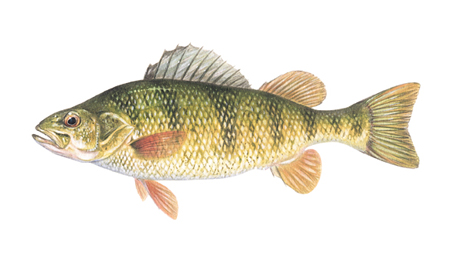Common Names: yellow perch, perch
Habitat
Yellow perch occur throughout most of Ontario. They seem to be very adaptable, and are found in a wide variety of warm and cool water habitats including large lakes, ponds and rivers. They are most commonly found in the open water of lakes with moderately clear water and moderate weed growth. They seem to prefer water temperatures near 70 °F (21 °C).
Spawning Patterns
Yellow perch spawn in early spring from mid-April to early May at water temperatures between 6 and 12 °C. They spawn in shallow areas, or in tributaries. They usually spawn near woody debris or rooted plants. They lay their eggs in long, transparent, jelly-like masses about 2 inches (5 cm) in diameter and can be several feet long. A 10-inch female (25 cm) perch may lay up to 61,000 eggs.
Diet
Yellow perch feed extensively on aquatic insects and, as they get older, small fish of all species, including yellow perch. Feeding is most aggressive in the mornings and evenings.
Age and Size
Age and growth varies widely between perch populations. For example, perch may reach 10” (25 cm) by age four in Lake Erie; however, in many small inland lakes, perch may never exceed 6” (15 cm). Perch can live to be over 11 years of age.
Fishing Tips
Yellow perch are one of Ontario’s most sought after fish, both by anglers and commercial fishermen. Yellow perch are one of the finest tasting freshwater fish. Perch tend to form large schools, making them easy to catch. Popular baits include small minnows, worms and grubs, as well as small jigs and spinners. They can be caught in a variety of habitats year-round. Perch are readily caught through the ice throughout the entire winter as well. Recently, catch and possession limits have been imposed on a number of water bodies; check your regulations for details.
Fish illustration ©CURTIS ATWATER (www.natureartists.com/atwaterc.htm)









